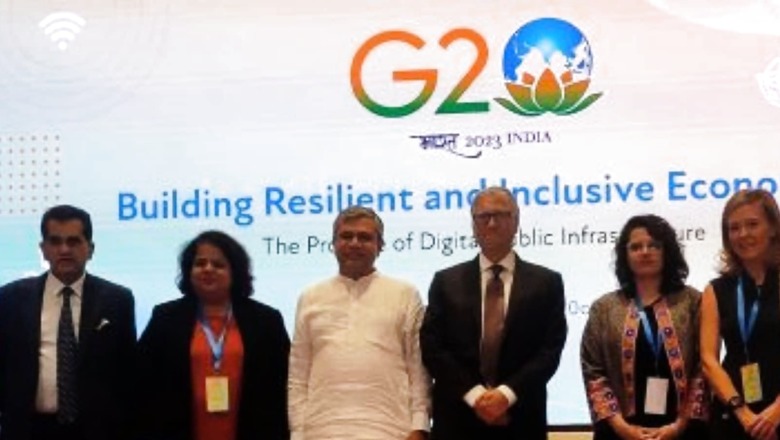
views
Microsoft founder and IT czar turned philanthropist Bill Gates praised India’s digital infrastructure at the G20 session on ‘Building Resilient and Inclusive Economics’ in New Delhi on March 1 and said it can be “such an example” for other countries.
Gates, who was the guest of honour at the G20 session, patted India for its “excellent digital network”, dependable and affordable connectivity, and claimed it could be the “most affordable 5G market”.
The IT magnate also discussed India’s Aadhaar digital identity system, and payment infrastructure—while mentioning the India-Singapore payment transfer initiative—and the quick steps the nation has taken to integrate more people into the banking system.
Amitabh Kant, Ashwini Vaishnaw, Bill Gates and Industry Executives attended the #G20 event in #NewDelhi. The panel discussion on public digital infrastructure was organized at Sushma Swaraj Bhawan today. @Bhaswati19Guha takes us through pic.twitter.com/NrPA637XEh— News18 (@CNNnews18) March 1, 2023
He said: “No country has built a more comprehensive platform than India…Because of the pioneering investment including creating the basic Aadhaar identity, India was in the lead in getting out (relief) payments…during the Covid-19 pandemic.”
“India, in particular, by laying the groundwork for digital public infrastructure starting with identity system, allows people to build on top of that. To make financial access and financial payment an element of that in a trusted way allows for an incredible variety of applications,” he noted.
The billionaire stated that “we are just at the beginning of this. We are seeing incredible ingenuity about using this, and it is in many different sectors”. He also pointed out that from the start, the digital vision covered things like facilitating the interchange of educational resources or aiding the government in its duties.
Gates believed that other nations could adopt the India model, something which the chief guest of the event, Union IT Minister Ashwini Vaishnaw also mentioned during his speech.
Vaishnaw said 2023 is going to be a landmark year for India, and stressed that digital technology has come of age and technology is now a big part of daily lives. Additionally, Vaishnaw said technology has advanced to the point where quantum computing, 5G, and artificial intelligence (AI) are all commonplace.
Public-Private Partnership
While talking about India’s digital infrastructure, the telecom and IT minister pointed out that India has developed a distinctive framework for the digital economy that is focused on improving people’s lives.
“Unlike many geographies where digital technology was concentrated with big tech companies, India has a public-private partnership model where every stakeholder has an important role,” Vaishnaw explained.
He also said India has made it a policy priority for all societal segments to benefit from digital technology. India, according to the minister, is “happy to share” its technologies with the rest of the globe.
On 4G and 5G technology, the minister revealed that India has developed a complete end-to-end 4G-5G telecom technology stack. He also pointed out the installation of the first made and designed-in-India eNodeB (base station equipment that handles radio interface with smartphones) in Chandigarh recently, which is a significant milestone for the Make-in-India mission.
Fintech India
However, later one of the panellists, Upasana Taku, Cofounder and COO of MobiKwik talked about fintech India, which is a promising sector at this moment and has the largest number of start-ups in the country. She said big tech companies are showing interest in this sector in recent times.
She said: “Fintech is a good case study of developing on the back of digital public infrastructure. Without India Stack—Aadhaar, UPI—we won’t be where we are now. But with all these revolutions that have happened, we are still at the tip of the iceberg.”
Taku noted that still only 300 to 400 million Indians are uniquely using digital payments and fintech has a long legroom to improve going forward.
Meanwhile, Lizzie Chapman, Co-Founder & CEO of ZestMoney, said the story of fintech India is about financial inclusion and building a product for the mass market. She said there is no need to depend on the legacy system like using credit cards and that is why “we have found ways to distribute credit, safely and efficiently, at microscale of the segments to the country”.
However, Mabel Chacko, Co-founder and COO of Open Financial Technologies Private Limited, which offers a business banking platform to SMEs and start-ups, believes her company would not have been able to do the work without a digital infrastructure in place.
Read all the Latest Tech News here
















Comments
0 comment